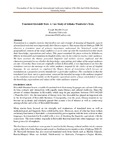| dc.description.abstract | Translation is a complex exercise that involves not only transfer of meaning of linguistic aspects
of translated texts but more importantly their literary aspects. This means that as Omboga 2006:50
observes a translator must of primary importance understand the historica,l social and
geographical contexts of the target audience so as to come up with the translated text that meets
their knowledge, expectations and values. This paper examined the plays written by Kithaka wa
Mberia in Kiswahili and translated in English with a view by the writer to reach a wider audience.
We have assessed the themes presented, linguistic and stylistic devices employed and the
characters presented to see whether the knowledge, expectations and values of the target audience
are met. Given that these texts are originally written in Kiswahili, it was important to see how the
translator conveys the message to the wider audience targeted by the choice of use of English
language. In our analysis we employed the Skopos theory of translation which focuses on
translation as a purposive activity intended for a particular audience. The conclusion is that the
translated texts have not to a great extent conveyed the intended message to the audience targeted
as the translators focused mainly on the linguistic equivalents and to a large extent failed to meet
the knowledge, expectations and values of the wider audience targeted. | en_US |

